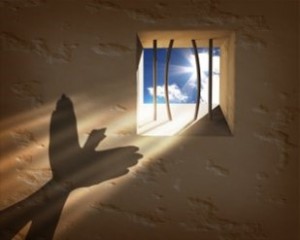 My friends and collaborators in the Lifers’ Unlimited Club at the Oregon State Penitentiary are putting together a book of essays, poems, and art by their members and fellow prisoners. They are planning to self-publish the book and sell copies to men inside the prison and their friends/families to raise money for the Angels in the Outfield, a community organization that works with children impacted by crime or child abuse. They gave me the honor of writing the foreword to the book; since the book will likely have a limited, local audience, I am sharing a lengthy excerpt of my piece and my thoughts here:
My friends and collaborators in the Lifers’ Unlimited Club at the Oregon State Penitentiary are putting together a book of essays, poems, and art by their members and fellow prisoners. They are planning to self-publish the book and sell copies to men inside the prison and their friends/families to raise money for the Angels in the Outfield, a community organization that works with children impacted by crime or child abuse. They gave me the honor of writing the foreword to the book; since the book will likely have a limited, local audience, I am sharing a lengthy excerpt of my piece and my thoughts here:
My journey into correctional facilities weaves through universities and has allowed me to spend considerable time in both state youth correctional facilities and state prisons. I consider the Oregon State Penitentiary my home base off of campus, and I feel very fortunate to work closely with the men inside. I began working with men in the Penitentiary in 2006 and started teaching college classes in the facility in January 2007. The men who chose to participate in this new program did so with no promise of incentives, rewards, or college credit. They did it simply for the experience and the novelty of stepping out of their comfort zones to try something different and to potentially bring something of value to others in the prison. The Lifers, particularly, adopted the college program and used their influence to help it gain a foothold and flourish in the institution.
In many ways, I was adopted by the Lifers, as well, and my relationship with the men and the club has only deepened over time. My friends and collaborators in the Lifers’ Club are involved in many of the positive programs, activities, and clubs available in the Penitentiary, and they consistently work to “give back” and to improve the community both inside and outside of the prison walls.
I know that I am one of the lucky ones. I was born a white female at a time when race and gender have a large impact on one’s life chances. I had a supportive family – parents and older siblings who loved me and instilled strong working class values. During the risky teenage years, I was fortunate to be surrounded by protective friends who worked to keep me out of trouble rather than pull me into bad situations. I had teachers who recognized my potential and treated me well. I was encouraged rather than discouraged. Like many others in the outside community, I do not have to face my regrets and shame and sorrow on a daily basis. I am privileged to be able to move on from past mistakes with few if any scars.
Many of the men in the Lifers’ Club did not have these same advantages. Whatever the circumstances that led them to the prison, they are faced with the hard reality that they can’t change their pasts. From this moment forward they can only work toward better futures. Many of the Lifers spend years diligently trying to make amends for their actions in an attempt to restore the debts they may owe and to add value to the world around them.
I bring my university students into the Penitentiary to meet with the Lifers as often as I am allowed to do so. Meeting these men and speaking with them even for a few minutes often changes the students’ perspectives on prisoners and possibility. Even in very brief interactions, they come to see Lifers as three-dimensional human beings with strengths and flaws, regrets and passion. They learn that Lifers are sons, fathers, brothers, and friends, and they are valuable community members looking for ways to contribute to the larger society.
…I believe that on a personal level, change is inevitable. Changing into who you want to be takes work, focus, and commitment. Education is one powerful tool to open doors and help individuals move forward in the directions of their dreams, but there is no replacement for effort, grit, and a little humility. The men in the Lifers Club work tirelessly to improve themselves and to make a positive impact on the community in the ways that they can while limited by their circumstances. They inspire me to do better. For those of us without such limits, what are we doing to make the world a better place? What more can we do?
I am deeply grateful for all that the men in the Oregon State Penitentiary have taught me over the years. And because I believe that “the more you know, the more you owe,” I’ll continue working to share what I have learned.
